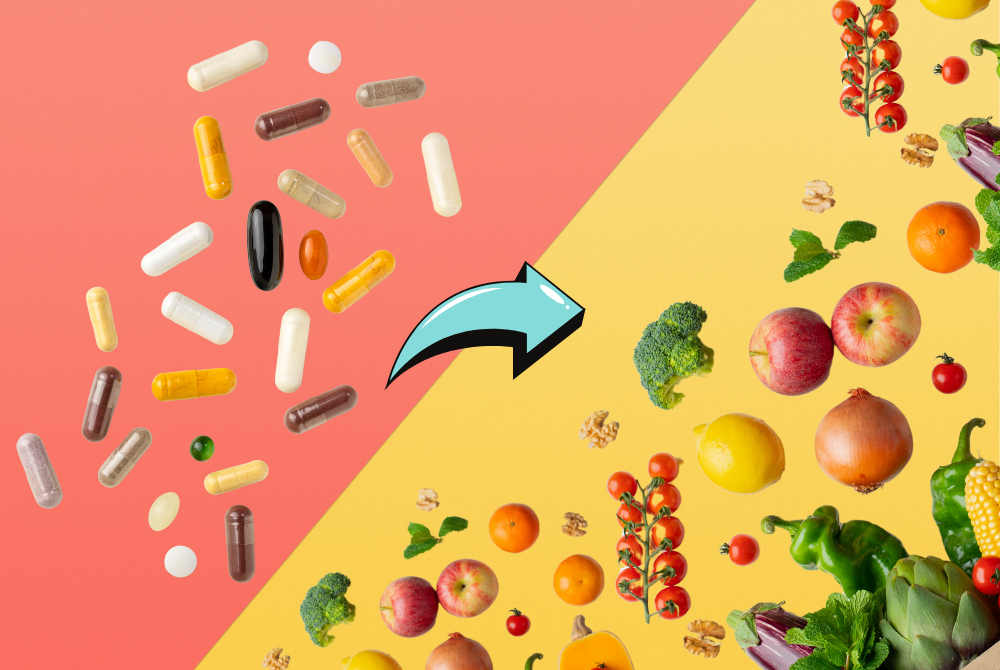Superfood alternatives you can eat to replace supplements
Fresh, whole foods can deliver essential nutrients and added health benefits without relying on pills or powders.

With the growing focus on health and wellness, dietary supplements have become a common part of many Malaysians' daily routines.
Malaysian Dietary Supplement Association (MADSA) member, Jonathan Chew pointed out that certain supplements, such as fish oil, vitamin C, vitamin D, multivitamins, and probiotics, are among the most widely used.
These supplements are not only common in Malaysia but also reflect a broader global trend towards boosting health through additional nutrients.
Here's a deeper dive into Jonathan Chew’s observations and how food alternatives can serve as effective replacements for these popular supplements.

Fish Oil
Fish oil, often taken for its omega-3 fatty acids, is praised for its benefits to heart health, inflammation reduction, and brain function.
According to National Institutes of Health (NIH), the two primary omega-3 fatty acids found in fish oil—EPA (eicosapentaenoic acid) and DHA (docosahexaenoic acid) are linked to reduced risks of heart disease, improved cognitive function, and anti-inflammatory properties.
If you want to avoid fish oil supplements, you can get omega-3s from whole food sources. Fatty fish such as salmon, sardines, and mackerel are some of the best natural sources of EPA and DHA.
The Harvard TH Chan School of Public Health through their online studies highlighted that plant-based options such as chia seeds, flaxseeds, and walnuts are excellent sources of omega-3 fatty acids.
However, these contain ALA (alpha-linolenic acid), which the body needs to convert into EPA and DHA to utilise effectively. The NIH provides detailed information that include algae-based supplements, which provide DHA and are ideal for those following a vegetarian or vegan diet.
By choosing these foods, you can achieve similar omega-3 benefits, often with the added bonus of other essential nutrients like protein, fiber, and antioxidants.
Vitamin C
Vitamin C known for its role in boosting the immune system, promoting healthy skin, and acting as a potent antioxidant. Many people turn to vitamin C supplements to ward off colds and infections or to reduce the appearance of wrinkles.
While vitamin C supplements are widely available, individuals can easily obtain this essential vitamin from a variety of nutrient-dense whole foods. Citrus fruits such as oranges, lemons, and grapefruits are among the most common sources, but they are far from the only options.
Vitamin C, known for its potent antioxidant properties, helps neutralise free radicals—unstable molecules that can damage cells and contribute to chronic diseases. For those following a plant-based diet, vitamin C plays an additional crucial role by enhancing the absorption of iron from plant sources, reducing the risk of anemia or iron deficiency.
It is known that beyond citrus fruits, other excellent sources of vitamin C include kiwifruit, strawberries, guavas, black currants, papayas, cantaloupes, and chili peppers. Vegetables like kale, broccoli, spinach, Brussels sprouts, and especially red bell peppers are also packed with this nutrient.
Vitamin D
Beyond its well-known connection to bones, vitamin D also supports immune function, mood stabilisation, and the reduction of inflammation. For individuals who spend much of their time indoors or live in regions with limited sunlight, vitamin D supplements are often a go-to solution to maintain optimal levels.
While vitamin D supplements are widely used, there are numerous natural and fortified food options available for those looking to boost their intake. Fatty fish like salmon, mackerel, and sardines are among the richest natural sources of vitamin D.
Meanwhile, the Academy of Nutrition and Dietetics emphasised that fortified foods can be a valuable addition to the diet. Dairy products like milk and yogurt, as well as plant-based alternatives such as almond, soy, and oat milk, are often enriched with vitamin D. Certain breakfast cereals and orange juice varieties also provide fortified options.
Interestingly, for plant-based eaters, mushrooms exposed to ultraviolet (UV) light, such as maitake and shiitake mushrooms, are highlighted as a unique vegan source of vitamin D. Incorporating these into meals can help individuals meet their daily vitamin D needs without relying solely on supplements.
Multivitamins
Multivitamins have long been regarded as a convenient solution for addressing potential nutritional gaps, particularly for individuals with hectic lifestyles or those who may not consume a well-rounded diet.
According to the Malaysian Dietary Supplement Association (MADSA), multivitamins remain among the most popular dietary supplements in Malaysia, aligning with global trends.
It's important to obtain essential nutrients through a diet rich in whole foods rather than solely relying on supplements.
Leafy greens such as spinach, kale, and swiss chard are excellent sources of vitamins A, C, and K, along with several B vitamins essential for energy production and cell health.
Similarly, whole grains like quinoa, oats, and brown rice provide a spectrum of B vitamins, iron, magnesium, and dietary fiber, which contribute to better digestive health and energy regulation.
Nuts and seeds, almonds, sunflower seeds, and pumpkin seeds are also known for their high nutritional value in vitamin E, zinc, and healthy fat content.
Probiotics
Probiotics are also linked to mental health benefits, thanks to their role in the gut-brain axis, a connection between gut bacteria and brain function.
While many people turn to probiotic supplements to support these functions, experts suggest that incorporating natural sources into your diet can be equally, if not more, effective.
According to Healthline, fermented foods are an excellent source of probiotics, providing live beneficial bacteria that support a balanced gut microbiome.
Yogurt with live active cultures, for instance, is one of the most widely consumed probiotic-rich foods, offering an easy and nutritious way to boost gut health. Other options, such as kefir and kombucha, provide similar benefits while introducing variety to the diet.
Moreover, savory options like kimchi, sauerkraut, and miso are highlighted as natural probiotic sources with additional health benefits. These foods are not only rich in probiotics but also contain essential nutrients, such as fiber, vitamins, and antioxidants, which support digestion and overall health.
For example, kimchi and sauerkraut are packed with vitamin C and other antioxidants, while miso provides plant-based protein and essential minerals like zinc. Including these foods in your diet can naturally enhance your gut health while adding flavor and variety to your meals.
Chew's observations about the most popular dietary supplements in Malaysia are a reflection of the growing global trend toward taking extra steps to improve health.
However, the truth is that many of the benefits provided by supplements can be found in whole, nutrient-rich foods.
Rather than relying on pills and powders, a diet filled with fresh fruits, vegetables, whole grains, healthy fats, and protein sources can provide the essential nutrients for body needs, often with the added benefits of other health-promoting compounds.
Of course, it’s always important to consult with a healthcare professional before making significant changes to diet or supplement regimen, however embracing whole foods as an alternative to supplements can go a long way in supporting long-term health.










